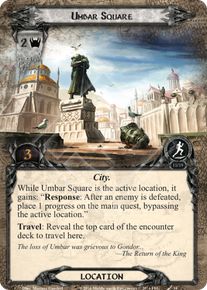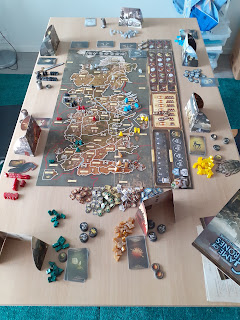Middle Earth, the War of the Ring
Historical brief
Should our reader be minimally acquainted with analysis of major military campaigns and examine the map of Middle Earth, he would easily ascertain that all actions of both new coalitions (Mordor-Isengard and Gondor-Rohan) were dictated by merciless strategic logic, undergirded by Mordor’s dread of being cut off from its food sources.
Chapter 5 starts the alternative history of the War of the Ring. Yeskov's comments on military history and strategy really reinforce the feeling from the previous chapters that he isn't nearly as clever as he thinks he is, but luckily the meat of these chapters is the diplomatic warfare leading up to the War of the Ring, and I like it.
After the White Council has decided on war, Saruman goes on diplomatic maneuvers. He assures both Théoden and Denethor, in this story the King of Gondor, that Mordor and Isengard only want peace, and teaches Denethor and Sauron how to use their
palantírs to stay in touch. Gandalf, however, is also working: Théoden's son and heir is mysteriously killed, supposedly fighting orcs, and Éomer, prominent in the "war party" in Rohan, becomes the new heir. In a counterstroke, Isengard's accredited ambassador to Rohan, Gríma (missing his accent) arranges for some of Éomer's less cautious talk about the imminent succession to come to Théoden's ears, and Éomer is disgraced. Saruman's agents also arrange for King Denethor's truculent heir, Prince Boromir, to be sent on some fool's errand to the north. Much of this actually plays out a lot like the early game in
War of the Ring, with Gondor and Rohan moving back and forth on the political track, which is a nice bonus; Yeskov's story predates the board game.
Things are going badly for Gandalf, so he raises the stakes: mysterious rangers from the north ambush several Mordor-bound caravans in Ithilien, and the parliament of Mordor, uncharitably described as "fear-crazed storekeepers" votes to send the army into Ithilien. Gondor responds by mobilizing and occupying Osgiliath.
Mordor then attempts to change the strategic balance by covertly sending four battalions of troops across northern Rohan to Isengard, to form a strike force to deter Rohan from going on the offensive. Unfortunately, the ploy is detected through the Mirror, and Gandalf informs Éomer, who takes advantage of Théoden's illness and his personal popularity among the troops to lead a cavalry force to rout the Mordorian troops.
As the Mordorian survivors withdraw to Fangorn, they "fell to the poisoned arrows of the Elvish bowmen in their tree perches". I can't pass this by without noting that this is a possible reference to Finland. One of the oddities of Stalin's invasion of Finland, i.e. the 1939-40 Winter War, is that for decades afterward, Soviet veterans would insist that Finnish snipers fired on them from trees, while the Finnish army maintains they never stationed snipers in trees. A treetop would be a terrible firing position anyway, and I can't think of any reason the Finnish military would lie about this, so it's a genuine mystery where this idea came from. This has been your random Second World War trivia of the day.
Anyway Gandalf succeeds: Éomer is hailed as a conquering hero, and Théoden has no choice but to go along. Soon enough, Éomer is clamoring to attack Isengard.
It's a plot point here, then, that food is imported into Mordor by caravans through Ithilien. Because the Ithilien crossroads are specifically mentioned several times, the caravans are presumably coming up the Harad road into Ithilien. I'm going to repeat myself, but this is flatly impossible, and also makes no sense at all. With the technology available in Middle-earth, it just isn't possible to transport sufficient amounts of food to feed entire cities by land over these kinds of distances. The amount of food needed to feed the animals doing the hauling would be so prohibitive that the logistics just cannot be done.
Also, we were told that the food comes from Khand and Umbar. Umbar is a seaport. It would be complete lunacy to haul anything by land from Umbar to Ithilien when you can get on a boat and sail up the Anduin. Even then, there's no way to get the food to Barad-dûr, but if the plot point was that food is shipped up from Umbar to Minas Morgul, that at least might make an ounce of sense.
There's a double irony here. It's not just the air of superiority which Yeskov has assumed over Tolkien and the didactic tone of his work, both entirely based on the idea that Tolkien hasn't bothered to think about the practicalities of the world he set his stories in - only for him to completely fuck up a key plot point in his story. But what's worse is that if Yeskov had realized that the food needs to be moved by water, it would have made the diplomatic maneuvering much more interesting. If the food was loaded onto ships at Umbar, the logical place to offload it would have been at Osgiliath - meaning Gondor would have been making good money out of the trade. Unfortunately this opportunity was lost.
If I was to write a sequel or response to the Last Ringbearer, I'd insist that it's flatly impossible for the Mordor described in the work to exist where it did, because the logistics are totally implausible. Mordor and Barad-dur must have actually been somewhere else, and the story was later transposed to Gorgoroth. Isn't it actually much more believable that "Barad-dur" was actually, say, Minas Tirith?
Since a Middle-earth Fomenko was already mentioned, I have to say that I finally feel like I'm living up to my potential as a student of Arabic and Islamic studies at the University of Helsinki, which I still technically am, by setting up as a Middle-earth Patricia Crone.
**
Meanwhile, the armies of Mordor and Gondor are facing each other across the Anduin in what Yeskov terms a "phony war". I don't quite know what to make of the constant anachronistic allusions to the Second World War, but to be honest by this point I'm getting kind of tired of them. If the idea here is that Tolkien's world is great, can it have an existence of its own instead of being a constant foil for analogies to ours? In other words, if Tolkien protested too much that nothing in Middle-earth was an analogy to anything, Yeskov damn near does the opposite.
Anyway this all changes with the loss of the four battalions sent to Isengard - we'll call them task force Grishnákh. We're told that even before the task force was dispatched, Mordor and Isengard were seriously outnumbered. Now, after the Battle of Fangorn, Mordor's forces are so depleted that they can no longer hold Ithilien and ensure the passage of the impossible food caravans. This means Mordor needs to drastically change their strategy and attack before Rohan conquers Isengard and the combined Gondor-Rohan forces take Ithilien.
Yeskov said earlier, of task force Grishnákh: "as it always is with strategic decisions, that could only be judged post factum: had the move worked, as it had every chance of doing, it would no doubt have been recorded as brilliant". He's trying to be very clever again, but this is flat out wrong. If the loss of task force Grishnákh invalidates Mordor's entire strategy and forces them into a desperate offensive, then the risk was far too great, and sending the task force was a mistake a priori.
Mordor's plan now is to gather as large an army as possible, and defeat Gondor quickly, before the Rohirrim can successfully besiege Isengard. This initially seems like a good plan, but the elves solve the Isengard problem: to the horror of Gandalf and the Rohirrim, they destroy the dams on the Isen, drowning the entire city of Isengard overnight. Worse, Mordor knows nothing of it, because Gríma has defected and taken Saruman's palantír with him.
The offensive by Mordor's South Army is still a success: they cross the Anduin, breach the Pelennor walls and besiege Minas Tirith. When Sauron offers Gondor peace in return for the right to occupy Ithilien, King Denethor agrees immediately. Before the agreement can be finalized, Denethor mysteriously falls ill, and with his heir, Prince Faramir, also indisposed, a figure in a white cloak takes over the negotiations as the military commandant of Minas Tirith. He insists that the peace treaty will be signed, everyone just has to wait a bit for the king to recover.
This is really almost lampshaded in the
Siege of Gondor, when one of Denethor's servants asks Pippin: "Who is the master of Minas Tirith? The lord Denethor or the Grey Wanderer?" Pippin's reply, "The Grey Wanderer or no one, it would seem", verges on smart-alecky, and to be honest, what Gandalf does in the
Lord of the Rings damn near amounts to a coup.
So, the South Army camps out around defeated Minas Tirith. What could possibly go wrong?
**
We're six chapters into the Last Ringbearer; let's take stock.
As a general writing tip, I would reconmend not starting a chapter with condescending nonsense about being "minimally acquainted with analysis of major military campaigns" and then completely fuck up the most elementary logistics of your grand war narrative, while also dropping snide remarks on strategy that are just rubbish.
So yeah, I have to admit that Yeskov's arrogance is really starting to grate on me. At best, it comes across as smart-alecky, at worst as sneering condescension; both combine poorly with the fact that he is a total dilettante when it comes to anything to do with the military. I really hope there's an actual story at some point, because while I like some of this stuff, I'm also reaching my limit on poorly written "ha ha look how much smarter than Tolkien I am" fanfic. If there isn't, I will just give up on this.

















